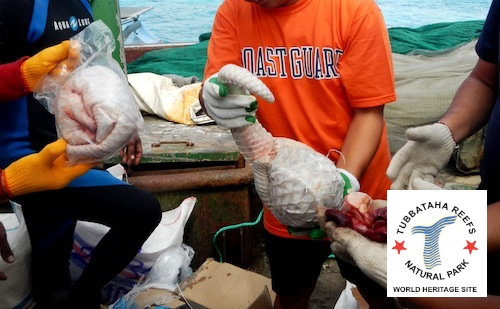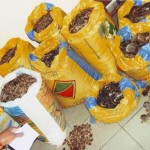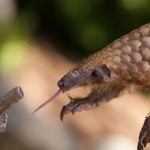
A Chinese fishing vessel which ran aground in Tubbataha Reefs Natural Park, a UNESCO World Heritage site in the Philippines, was carrying 400 boxes of frozen pangolins in its cargo hold. Each box reportedly contained 25 to 30 kilograms of pangolins.*
The 12 Chinese fishermen aboard the ship were taken into custody on April 8th and are currently being held at the Palawan provincial jail. They were charged with poaching, attempted bribery of marine park rangers, and several violations of the Tubbataha Reefs Natural Park Act.
On April 11th, Chinese Foreign Ministry spokesperson Hong Lei said via Xinhua “China urges the Philippines to guarantee the safety and legitimate rights of the Chinese fishermen it has taken into custody”. Ironically, the same press release stated that “the Chinese government always attaches great importance to the security of its fishermen abroad, while educating and supervising them on their fishing activities“. (So, how did 400 boxes of frozen pangolins evade China’s “supervised fishing activities”?)

Lieutenant Commander Armand Badillo, spokesman of the Philippine Coast Guard (PCG), told Gulf News that the PCG would “find out if the frozen scaly anteaters or pangolins, also known as balintong, were taken from Tubbataha Reef or from a nearby area in the Philippine territory.”
Each of the boxes had 25 to 30 [kilograms of] frozen anteaters, said Badillo.
Under Philippine laws, the Chinese nationals would face additional charges for trafficking in endangered pangolins.
Pangolins are unfortunately considered a “delicacy” in China, while their scales are used in traditional Chinese medicine. There is no proven medicinal benefit to consuming pangolin scales, which are comprised of keratin — just like our fingernails and toenails.
In 2012, an estimated 60,000 pangolins were killed in the illegal trade.
*Updated 04/16/2013: 400 boxes with a total weight of 10,000kg each contained 25 to 30 kilograms of pangolins, which amounts to a shocking 2,000 pangolins. We note that varying quantities in this incident were initially reported: 25 to 30 pangolins per box, 10,000 kg of pangolins, 2,000 pangolin “pieces” and 400 pangolins.



![Pangolin Trafficking: 2011 to August 2013 [Infographic]](https://annamiticus.com/wp-content/uploads/2013/08/PangolinsInTrade2011thruAugust2013-150x150.jpg)
